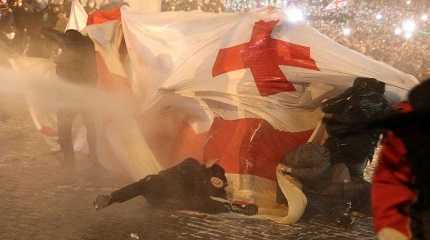
TBILISI, March 7 (Reuters) - Protesters in the small ex-Soviet state of Georgia threw petrol bombs and stones at police on Tuesday night after parliament gave its initial backing to a draft law on "foreign agents" which critics say represents an authoritarian shift.
Police in the centre of the capital Tbilisi used water cannon and tear gas in attempting to disperse thousands of demonstrators, who fear the draft law could hurt the South Caucasus country's hopes of European Union membership.
The law, backed by the ruling Georgian Dream party, would require any organisations receiving more than 20% of their funding from overseas to register as "foreign agents", or face substantial fines.
Critics have said it is reminiscent of a 2012 law in Russia that has since been used to crack down on dissent.
Georgian President Salome Zourabichvili, who wants to veto the law it if crosses her desk, said she was on the side of the protesters.
"You represent a free Georgia, a Georgia which sees its future in the West, and won't let anyone to take this future away," she said in an address recorded in the United States, where she is on an official visit.
"Nobody needs this law ... everyone who has voted for this law has violated the constitution," she said. Parliament, though, can override her veto.
Protesters angrily remonstrated with police armed with riot shields who then used tear gas and watercannon. At least three petrol bombs, as well as stones, were thrown at police.
People suffering from the effects of tear gas were being treated on the steps outside the parliament building.
"I came here because I know that my country belongs to Europe, but my government doesn't understand it", said 30 year old protestor Demetre Shanshiashvili.
"We are here to protect our country because we don't want to be part of Russia again", he added, referring to the almost two centuries Georgia spent as part of the Russian Empire and Soviet Union.
PARLIAMENTARY READING
Earlier, the law had comfortably passed its first parliamentary reading, Georgian media outlets reported.
Some of the protesters gathered outside the parliament building carried Georgian, European Union and U.S. flags, and shouted: "No to the Russian law", and "You are Russian" at politicians inside the legislature.
Russia is viewed as an enemy by many Georgians, after Moscow backed separatists in the breakaway Georgian regions of Abkhazia and South Ossetia in the 1990s. Hundreds of thousands of Georgians remain internally displaced within the country after several bouts of bloody ethnic conflict.
Speaking in Berlin earlier on Tuesday, Georgian Prime Minister Giorgi Garibashvili reaffirmed his support for the law, saying the proposed provisions on foreign agents met "European and global standards".
The United States was closely following developments in Georgia, State Department spokesperson Ned Price told reporters.
BRAWL
The ruling party, which says it wants Georgia to join the European Union, has accused critics of the bill of opposing the Georgian Orthodox Church, one of the country's most respected and influential institutions.
On Monday, a committee hearing on the law ended in a physical brawl in parliament.
More than 60 civil society organisations and media outlets have said they will not comply with the bill if it is signed into law.
Georgia's government has in recent years faced criticism from observers, who say the country is drifting towards authoritarianism. In June, the EU declined to grant Georgia candidate status alongside Moldova and Ukraine, citing stalled political and judicial reforms.




